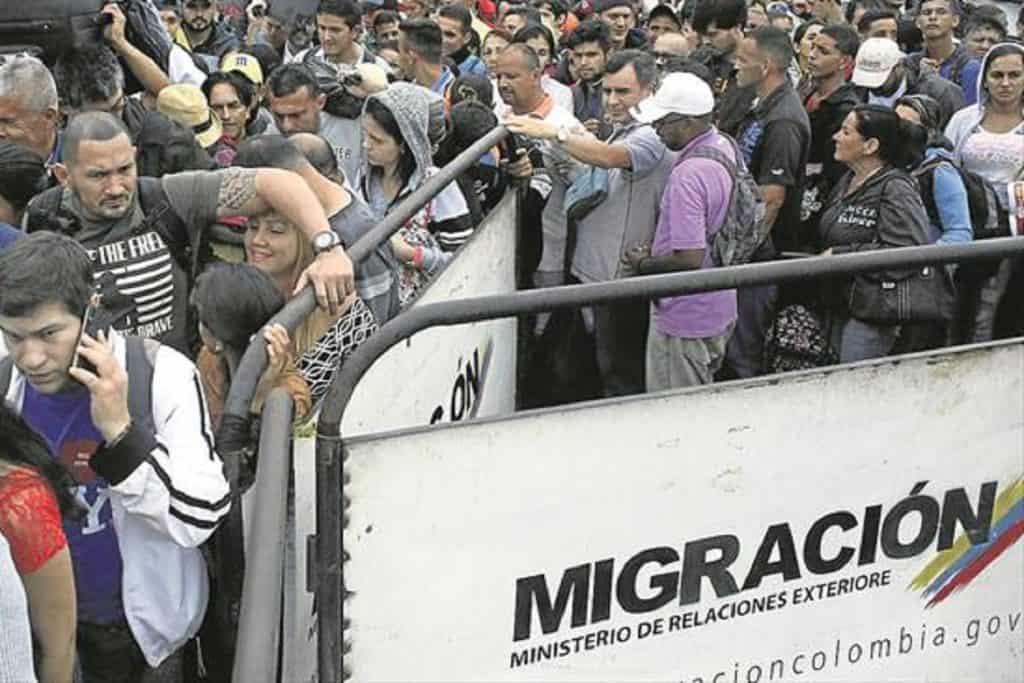By Gustavo Alberto Manzo Ugas (Lawer and University Professor of Constitutional Law, Politics, Philosophy. From Caracas, Venezuela)
Depending on where the gaze is fixed, from a historical point of view, to establish a context in which a balance of the bilateral relations of these border countries can be carried out, the results will be diametrically different. In the most culminating era of the Colombian conflict, with the presence throughout its territory of at least three different armed movements (FARC, ELN and Paramilitaries), the exodus of the Colombian population was strongly felt in Venezuela.
Today the migration process is completely the reverse. Both countries have had in the last thirty years sensitive variations in their economy. Venezuela, which is currently going through a hyperinflation process that places it as the first reference point of this phenomenon, has ceased to be an oil producing country and it is facing many challenges. Meanwhile Colombia has come from less to more. Especially in the last decade, the Colombian gross domestic product has been increasingly maintaining positive levels.
If the review of the geopolitical options of both countries is done through their relations, it must be noted that the biggest step was done with the entry of Colombia into North Atlantic Treaty Organization (NATO), and the response of Venezuela, with the consolidation of its relations with Cuba, China and Russia, as main axes and, in a second level of importance, with Turkey, Iran and Belarus.
As in the practice of diplomatic relations, these tendencies have taken shape with reciprocal and constant visits to each of these border countries to their respective allies. Therefore, geopolitical blocks have been formed around the two countries and the strengthening of their international relationships covered different thematic areas: economy, cooperation, development, defense, to mention just a few.
From the allied blocs of both countries actions and responses have been taken that have touched also military aspects with constant visits from Russia and Cuba to the Caribbean country and, previously, the installation of US bases in Colombia.
In the same vein, the bilateral historical relations have become complicated with the arrival of Hugo Chávez, two decades ago, and its level of complexity has grown with the rise of Nicolás Maduro to the Venezuelan first magistracy. At present the highest level of confusion turns around the number of Venezuelans who moved from Venezuela to Colombia creating an additional burden in different areas such as health, social security, education and infrastructure .
Until a few months ago the Venezuelan diaspora reached four million people and the first destination was Colombia. Today it can be said that the number exceeds the five million people, without including the black figure (immigrants left or admitted by the so-called green roads).
The growing authoritarianism with which Venezuela manages its internal policy, reflected in its foreign relations, adds additional elements to this narrative. The Venezuelan diaspora has already become a hemispheric problem and it further strains the bilateral relations. Without the possibility of determine clearly when the migratory phenomenon will stop or the causes that generated it will be remedied. But if the negative impact in the Colombian economy is verified, the counter-vision is in the increase of the oil production of the Colombia Ecopetrol driven in by the presence of specialized workforce from Venezuela.
Venezuela recently accused Colombia of a plot for the assassination of the Venezuelan President. Form the other side Venezuela has being pointed out as a spillway area for criminals and guerrillas.
The challenges to neighboring countries are facing are linked to the development of the internal situation of Venezuela, with the strong blow of last January, when the president of parliament Juan Güaido swore in as president of the Republic and a parliamentary agreement was carried out, which declared null the election of Maduro as president, also adducing, absence of democratic legitimacy in the election process.
This has caused the pronouncement of different countries. United States, Canada and the European Union assumed the leadership for the imposition of different types of sanctions to Venezuela, for behaviors associated with corruption and drug trafficking.
The strongest tone was used by US, who stated that “on the table there are actions of all kinds, without ruling out the use of force”, to consider the Venezuelan government as authoritarian or in terms of political science a “Dictatorship”.
During the course of the last few months, the land border between Venezuela and Colombia has been completely closed on several occasions. However, this did not prevent the going and coming of people, goods and services from one side to the other on irregular roads.
Even if the governmental bilateral relations between the two countries have ups and downs, the relations among the peoples remain firm. Colombia supplies in different ways to the deficiencies of Venezuela due to its economic crisis, with an external debt of above one hundred billion dollars and a contraction of GDP which has lasted for more than 4 years.
If the Venezuelan government will remain stable, new chapters of the bilateral relationship will surely emerge, since Colombia will try to gain influence in order to halt the exodus of the Venezuelan population. This trend has been observed in other countries of the southern cone, that have recently modified the regulations related to the immigration status, in terms of health, food and prosperity, of the groups of people fleeing in the face of adversity.
(The views expressed in this article belong only to the author and do not necessarily reflect the views of World Geostrategic Insights)
Image Credit: REUTERS / CARLOS EDUARDO RAMIRE







